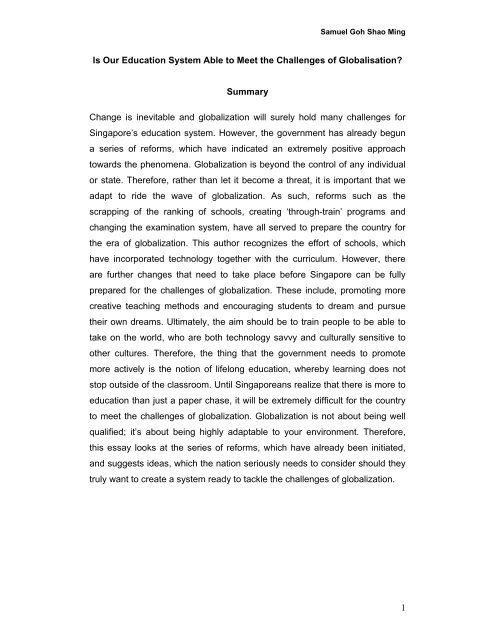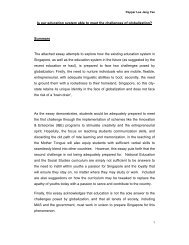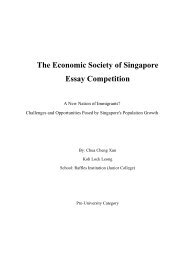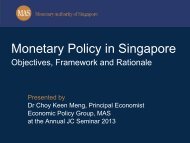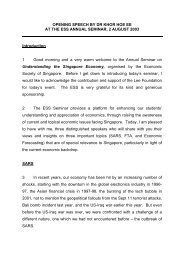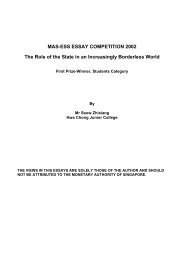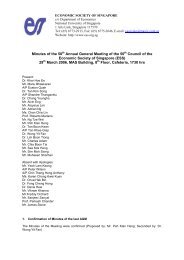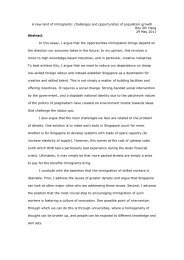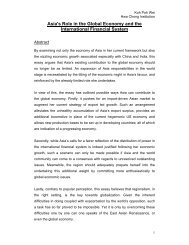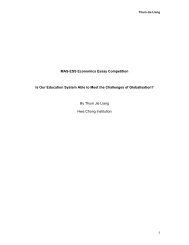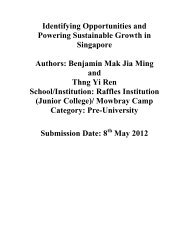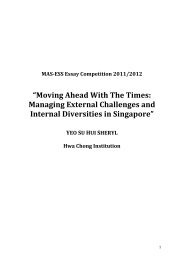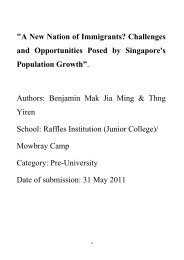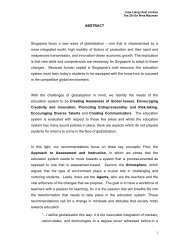Mr Samuel Goh Shao Ming - Economic Society of Singapore
Mr Samuel Goh Shao Ming - Economic Society of Singapore
Mr Samuel Goh Shao Ming - Economic Society of Singapore
You also want an ePaper? Increase the reach of your titles
YUMPU automatically turns print PDFs into web optimized ePapers that Google loves.
<strong>Samuel</strong> <strong>Goh</strong> <strong>Shao</strong> <strong>Ming</strong>Is Our Education System Able to Meet the Challenges <strong>of</strong> Globalisation?SummaryChange is inevitable and globalization will surely hold many challenges for<strong>Singapore</strong>’s education system. However, the government has already beguna series <strong>of</strong> reforms, which have indicated an extremely positive approachtowards the phenomena. Globalization is beyond the control <strong>of</strong> any individualor state. Therefore, rather than let it become a threat, it is important that weadapt to ride the wave <strong>of</strong> globalization. As such, reforms such as thescrapping <strong>of</strong> the ranking <strong>of</strong> schools, creating ‘through-train’ programs andchanging the examination system, have all served to prepare the country forthe era <strong>of</strong> globalization. This author recognizes the effort <strong>of</strong> schools, whichhave incorporated technology together with the curriculum. However, thereare further changes that need to take place before <strong>Singapore</strong> can be fullyprepared for the challenges <strong>of</strong> globalization. These include, promoting morecreative teaching methods and encouraging students to dream and pursuetheir own dreams. Ultimately, the aim should be to train people to be able totake on the world, who are both technology savvy and culturally sensitive toother cultures. Therefore, the thing that the government needs to promotemore actively is the notion <strong>of</strong> lifelong education, whereby learning does notstop outside <strong>of</strong> the classroom. Until <strong>Singapore</strong>ans realize that there is more toeducation than just a paper chase, it will be extremely difficult for the countryto meet the challenges <strong>of</strong> globalization. Globalization is not about being wellqualified; it’s about being highly adaptable to your environment. Therefore,this essay looks at the series <strong>of</strong> reforms, which have already been initiated,and suggests ideas, which the nation seriously needs to consider should theytruly want to create a system ready to tackle the challenges <strong>of</strong> globalization.1
<strong>Samuel</strong> <strong>Goh</strong> <strong>Shao</strong> <strong>Ming</strong>Is Our Education System Able to Meet the Challenges <strong>of</strong> Globalisation?The process <strong>of</strong> globalization is by no means a new phenomenon; in fact, theprocess <strong>of</strong> globalization is as old as the human race itself. In moderninternational relations however, ‘globalization’ is a buzzword, and itswidespread and casual use is not helpful towards our understanding <strong>of</strong> theprocess itself. It would help, therefore, to properly define the term.Globalization is defined as ‘a historical process, which transforms the spatialorganization <strong>of</strong> social relations and transactions’. 1 The emphasis here isplaced on the fact that globalization is a process, and not an event. Indeed, itis a phenomenon beyond the control <strong>of</strong> any individual state or corporation.While globalization has been presented as an opportunity, it has also beenperceived by many to be a threat. One thing for certain though, is that withglobalization, there will also be a new set <strong>of</strong> problems and challenges.Functionally, globalization has forced the state to adapt its way and policies inorder to remain relevant, in particular, education. This essay however, is notfocused on the process <strong>of</strong> globalization per se. Therefore, the term has beenloosely defined in the broadest sense. <strong>Singapore</strong> has long prided itself on itseducation system. This small island nation can boast the top scores ininternational competitions <strong>of</strong> its students. Granted, the system has no doubtbrought our society thus far and is continuing to produce scholars for theeconomy, but this begs the question <strong>of</strong> whether or not this system is sufficientto carry us through to the new century and beyond. The <strong>Singapore</strong>aneducation system now stands at a crossroads, the past forty years have beenprosperous, but the system now needs to change in order to meet thechallenges <strong>of</strong> globalization. Change is by no means easy, and in this case, itis a painful process that shakes the very core <strong>of</strong> our belief system. However,without change, it is courting certain doom. <strong>Singapore</strong> must adapt to meet thechallenges <strong>of</strong> globalization. Two thumbs up to the education ministry fortaking a pro-active stance in this regard, but it is worth looking at the currentsystem and the proposed reforms before making a fair analysis on whether or_____________________________________________________________________1David Held and Anthony McGrew, The global transformations reader : an introduction to theglobalization debate, Cambridge, Blackwell Publishers, 2000, p. 22
<strong>Samuel</strong> <strong>Goh</strong> <strong>Shao</strong> <strong>Ming</strong>not the <strong>Singapore</strong>an education system is able to meet the challenges <strong>of</strong>globalization. Therefore, by looking at the recent reforms in the educationsystem, this essay will discuss how ready the <strong>Singapore</strong>an education systemis to meet the challenges <strong>of</strong> globalization.Education lies at the very heart <strong>of</strong> much <strong>of</strong> <strong>Singapore</strong>an society. For the pastforty years, education has been perceived as the key to prosperity andbreaking out <strong>of</strong> the cycle <strong>of</strong> poverty, and indeed, this has been so. <strong>Singapore</strong>can stand proud that it has gone from third world poverty to first world richeswithin a span <strong>of</strong> thirty years or so, and this has been due to the education <strong>of</strong>her people. Much credit must go to the system that the previous generation <strong>of</strong><strong>Singapore</strong>ans has gone through. However, it is also from the educationsystem that the ‘kiasu’ syndrome is the most obvious. There is nowhere elsein the world where parents would queue up overnight just to get a place fortheir child in the top kindergarten. The amount <strong>of</strong> time and money whichparents spend sending their children for tuition or enrichment classes isstaggering. It would be interesting to do a survey on how much parents doactually spend on such activities, which are on top <strong>of</strong> school homework.Therefore, it is obvious that education is an issue that resonates very strongamong <strong>Singapore</strong>ans. Partially due to the Confucian system <strong>of</strong> puttingeducation as a priority, and also to the ‘kiasu’ mentality, the education systemhas come to mean more than just education. It has become a reflection <strong>of</strong> thecompetitiveness <strong>of</strong> society at large. In this sense, the student’s complainsabout feeling the pressure is not unfounded. Over the past few decades,education has become increasingly competitive due to the stigma involved indoing well or doing poorly. In competitive <strong>Singapore</strong>, the success <strong>of</strong> theirchildren is a measure <strong>of</strong> the success <strong>of</strong> the parents. The ranking <strong>of</strong> secondaryschools is a case in point. Two equally bright students, one from a top school,and one from a ‘neighborhood’ school would accord a different impressionamong people. Mention that you’re from Raffles Institution (RI) and peoplewould be impressed. However, mentioned that you’re from Jurong Secondary,and no one would give you a second look. This is by no means anexaggeration, sad to say, as this author has experienced it firsthand. Much3
<strong>Samuel</strong> <strong>Goh</strong> <strong>Shao</strong> <strong>Ming</strong>needed change however, has been made to the secondary school rankingsystem, <strong>of</strong>ficially, secondary schools are no longer ranked. However, thestigma <strong>of</strong> going to a ‘neighborhood’ school has already created substantialdamage for the past two decades in which the ranking system has been inplace. Every year, parents would eagerly await the ‘school-ranking’supplement in The Straits Times newspaper before making a decision inselecting a ‘good’ school for their <strong>of</strong>fspring. Hats <strong>of</strong>f to the ministry <strong>of</strong>education <strong>of</strong>ficials who realized that the school-rankings were doing moreharm than good. Unfortunately, the damage has already been done and itwould take at least a decade in order to undo the stigma involved in going to a‘good’ school and a ‘neighborhood’ school. Very diplomatically,‘neighborhood’ schools are not dubbed as ‘lousy’ schools, yet, in theperception <strong>of</strong> many <strong>Singapore</strong>ans that is the impression. Often, theseprophecies become self-fulfilling as non-elite students start to believe the factthat they can never be as good as other students in ‘better’ schools. As such,in order to adapt to the challenges <strong>of</strong> globalization, there must be a change <strong>of</strong>mindset among <strong>Singapore</strong>ans. Education is by no means an ends in itself,and <strong>Singapore</strong>ans need to stop thinking that going to a ‘neighborhood’ schoolis the end <strong>of</strong> the world. To succeed in this global environment, we need everypossible talent. Therefore, until <strong>Singapore</strong>ans can come to the realization thatthere is nothing wrong with going to a neighborhood school, the educationsystem cannot be fully ready to undertake the challenges <strong>of</strong> globalization.In order to meet the challenges <strong>of</strong> globalization, the examination system hasto undergo reform. The typical <strong>Singapore</strong>an school-going child has thefollowing milestones in his life: Primary Three Screening for the GiftedEducation Program, Primary Four for deciding whether the child would end upin EM1/2, Primary Six to decide which Secondary School he will go to,Secondary Two to decide which combination <strong>of</strong> subjects to take, SecondaryFour to decide which vocation he will pursue and Junior College Year 2 to seeif he/she is good enough for university entrance. The pattern is obvious, everytwo years; the child is faced with a major exam. At this point, one must reallyquestion the necessity <strong>of</strong> having such frequent examinations. There is nothing4
<strong>Samuel</strong> <strong>Goh</strong> <strong>Shao</strong> <strong>Ming</strong>to look forward to except exams. In the <strong>Singapore</strong>an system, with majorexaminations beginning at the tender age at nine, there is a tendency to favorthe early boomers while discriminating against the late developers. People,who do well in exams, usually continue to do well in exams and the samegoes for people who do not have exams as their forte. This author is notagainst examinations per se, but is against the excessiveness <strong>of</strong>examinations within the education system. The result is that instead <strong>of</strong>learning to gain knowledge, students are learning for the sake <strong>of</strong> passing theexamination. This robs students <strong>of</strong> vital opportunities to look into othermethods <strong>of</strong> learning. Yet, in order to get ahead in life, the student is forcedthrough the rigidity <strong>of</strong> the system. There is no longer any joy in learning. Thisis due to the emphasis which <strong>Singapore</strong> places on the examination system.Changes however, have been made in the past couple <strong>of</strong> years with theintroduction <strong>of</strong> the ‘throughtrain system’. In this system, students are allowedto skip their “O” levels and take a six-year program culminating in either the“A” levels or in the International Baccalaureate (IB). On the surface, it wouldseem as if educational reforms were beginning to take place across the entiresystem. However, upon closer examination, one would realize that theseprograms are mostly on available at ‘good’ schools, which accept only thecrème-de-la-crème <strong>of</strong> <strong>Singapore</strong>’s brightest students. Students who do well inexaminations will always do well in examinations, and it is by the system <strong>of</strong>examinations which determine who goes through the ‘throughtrain’ program.Ironically, it is the students in the ‘neighborhood’ schools who should pursuealternatives to examinations, as they most probably have talents, which arenot evident in examinations. This author proposes therefore, that alternativemethods <strong>of</strong> assessment be implemented for non-elite students so as to meetthe increasing demands <strong>of</strong> globalization.In this era <strong>of</strong> increasing globalization, it is absolutely crucial that one is able tothink creatively and outside <strong>of</strong> conventional methods. There is no such thingas promoting creativity while issuing guidelines on how to be creative. In thiscurrent age, while it is important to know basic facts and information, the bulk<strong>of</strong> the attention will be focused on the creation <strong>of</strong> new knowledge and5
<strong>Samuel</strong> <strong>Goh</strong> <strong>Shao</strong> <strong>Ming</strong>research as the human race progresses further into the information age. It istherefore important that the education system is able to produce people whocan think laterally, as well as being able to equip students with the correctskills in order to encourage them to create new knowledge. In this regard, thekey lies in the fact that young minds need to be stretched and challenged.Students should be encouraged to fail because failure is part <strong>of</strong> the learningprocess. Indeed, the system needs to stop frowning upon failure. However,due to a constant fear <strong>of</strong> failure, many <strong>Singapore</strong> students are terrified to gobeyond the boundaries <strong>of</strong> what they have been taught. The common pattern<strong>of</strong> doing well in the system seems to be memorization. Doing well, in thiscase, is equated to a good performance in the examination. However, sad tosay, memorizing facts via rote learning is simply taking the easy way out, it isnot a viable method in which the country should be looking to so as toprogress. Spoon-feeding students with notes and information is simply not theway to prepare for the challenges <strong>of</strong> globalization, although it is highlyeffective for the sake <strong>of</strong> passing exams. Memorizing requires neither thinkingnor analysis, just assuming things for granted. The results <strong>of</strong> rote learning areobvious, it results in people being full <strong>of</strong> knowledge, but yet they are unable toneither apply it nor express it. As a result, the memorized informationbecomes redundant. We need to teach students to express themselves bothin written form and spoken form. Memorization is most definitely not the waytowards building a system, which is capable <strong>of</strong> producing the next generation<strong>of</strong> thinkers and public speakers. Therefore, in order to prepare us for thechallenges <strong>of</strong> globalization, the system needs to reform itself in such a way,which encourages students to think out <strong>of</strong> the box instead <strong>of</strong> spoon-feedingthem with information, and this, has to start right from the beginning <strong>of</strong> theeducation system, and all throughout.In order to meet the challenges <strong>of</strong> globalization, there has to be a broadbasededucation with emphasis not only on mathematics and the sciences,but also on the arts and the creative arts. Students should be encouraged towork towards their passion and interests. Many a time, students areencouraged to specialize in mathematics or science as these subjects are6
<strong>Samuel</strong> <strong>Goh</strong> <strong>Shao</strong> <strong>Ming</strong>seen as more ‘academic’ and therefore more employable. The arts, in thiscase, are deemed as ‘no future’. This mentality is grossly inaccurate. The artsand the sciences are both crucial for the development <strong>of</strong> the nation; toadvantage one over the other is courting certain disaster, as both fields areessential to tackle the challenges <strong>of</strong> globalization. We need a balance <strong>of</strong> both,and we must encourage scholars <strong>of</strong> both disciplines. As the process <strong>of</strong>globalization gathers pace, it will also affect the growth <strong>of</strong> global civil society.A hallmark <strong>of</strong> global civil society is the ability to go beyond the academicpursuit <strong>of</strong> education and having a heart to care for others. <strong>Singapore</strong>,unfortunately, is still some way <strong>of</strong>f from that caring and gracious society whichwas envisioned by then Prime Minister <strong>Goh</strong> Chok Tong in 1990. Education ismore than academic study. Education prepares you for life and it builds themind, character and the soul, it must inculcate a sense <strong>of</strong> morality and socialresponsibility. Ultimately, the purpose <strong>of</strong> education should be to prepare onefor life. Values such as volunteerism and community work are not naturallyacquired values, these are values, which are taught, and these are values,which are severely lacking in our education system. Even though young<strong>Singapore</strong>ans must complete a minimum <strong>of</strong> six hours <strong>of</strong> community serviceeach year, the aim <strong>of</strong> cultivating a sense <strong>of</strong> social awareness is not hitting itstarget. Young <strong>Singapore</strong>ans seem to be turning a blind eye to the needsaround them. For example, this author was on a bus recently with lots <strong>of</strong>secondary school children and an elderly man was trying to get <strong>of</strong>f the buswith two large grocery bags. It was disheartening to see that not even onestudent attempted to help the elderly man with his bags. This begs thequestion <strong>of</strong> whether or not students are just doing community service for thesake <strong>of</strong> fulfilling an obligation, rather than <strong>of</strong> genuine concern. As thepopulation <strong>of</strong> <strong>Singapore</strong> beings to experience the effects <strong>of</strong> an ageing society,younger <strong>Singapore</strong>ans must have a greater sense <strong>of</strong> social responsibility.This author admits that it is extremely difficult to teach, but to teach socialawareness would be a blunder; social awareness must be created anddemonstrated in practice by example. Perhaps greater emphasis must beplaced on civics and moral education so as to create an environment wherehelping someone in need is not seen as a chore. In line with globalization andin order to move towards a global civil society, it is important that education be7
<strong>Samuel</strong> <strong>Goh</strong> <strong>Shao</strong> <strong>Ming</strong>looked upon as more than just academic pursuit, but it is also the acquiring <strong>of</strong>values such as a sense <strong>of</strong> social responsibility and social awareness.The education system must adapt in order to stay relevant to the knowledgeeconomy. As such, the recent reform <strong>of</strong> the teaching <strong>of</strong> the Chinese languageis a step in the right direction. While the global language <strong>of</strong> commerceremains English, the Chinese language continues to instill in the youngergeneration a sense <strong>of</strong> cultural heritage and belonging. In a world <strong>of</strong> mergingcultures and <strong>of</strong> an emerging global culture, it is <strong>of</strong>ten difficult to distinguishoneself from other cultures. In an increasingly globalized world, while onemust be global in outlook, one must also have a sense <strong>of</strong> belonging andattachment. However, it is the change in the teaching method <strong>of</strong> the Chineselanguage that is in-line with the future method <strong>of</strong> education <strong>of</strong> havingpersonalized learning styles suited to each individual child at his/her ownpace. This, blended with information technology will ensure that <strong>Singapore</strong>continues to produce bright young sparks. With the reforms to the teaching tothe Chinese language, <strong>Singapore</strong> is taking a step in the right direction towardsan overhaul <strong>of</strong> the traditional methods <strong>of</strong> teaching. Hopefully, the change instyle <strong>of</strong> the teaching <strong>of</strong> the Chinese language will be the spearhead and thefirst <strong>of</strong> the method <strong>of</strong> teaching towards our students. The needs <strong>of</strong> this worldwill be ever changing; therefore, it is important that the system must adapt inorder to stay relevant. In the aspect <strong>of</strong> teaching methods, <strong>Singapore</strong> hasalready begun to adapt to these necessary changes, as such, the country’seducation system is one step closer to the meeting the challenges <strong>of</strong>globalization.Education is a lifelong process. Education does not and should not stop themoment one leaves the formal system <strong>of</strong> education. This will become evenmore critical in the era <strong>of</strong> globalization, where one needs to constantlyupgrade his/her own skills. Therefore, the education system needs to create afoundation, which is suitable for acquiring more information at a later stage inan individual’s life. And this lies at the heart <strong>of</strong> the method <strong>of</strong> instruction. Pure8
<strong>Samuel</strong> <strong>Goh</strong> <strong>Shao</strong> <strong>Ming</strong>memorization techniques are not the solution towards building a nation <strong>of</strong>thinkers. A system is only as good as the people who run the system. And tobe honest, there is no such thing as a perfect system. There is always a wayto improve and do things better. As external observers, we can only commentand give suggestions, what is needed in the system now, is a change <strong>of</strong>mindset, in the educators, the students and the parents. Until the oldergeneration <strong>of</strong> teachers and principals can come to terms with the changingnature <strong>of</strong> education, it is impossible for the system to be able to rise up tomeet the challenges <strong>of</strong> globalization. Our teachers hold the key in preparingthe future generations <strong>of</strong> young <strong>Singapore</strong>ans for this globalized world. At thesame time, principals must encourage their teachers to be daring in theirteaching styles. Perhaps it is also time that principals review the way in which‘creative’ teachers are being restrained for being too flamboyant. In a countrywith limited resources, we cannot afford to lose our most ‘creative’ teachersdue to bureaucracy and traditional ways <strong>of</strong> doing things, it would a sheerwaste <strong>of</strong> talent if teachers left the system because the system was so rigidthat it gave them no breathing space, and unfortunately, this has been thetrend among young teachers. Therefore, in order to have the system ready forthis age <strong>of</strong> globalization, we need to encourage our teachers to think outsidethe box and promote creativity among them.In conclusion, the <strong>Singapore</strong>an education system has already begun to takesteps towards meeting the challenges <strong>of</strong> globalization. And indeed, these areextremely positive steps in the right direction. It has <strong>of</strong>ten been remarked thatthe first step is always the hardest, and indeed, changes are neither easy norpleasant. However, it is with bubbling aspirations that this author concludesthat <strong>Singapore</strong> is well under way towards tackling the challenges <strong>of</strong>globalization. From the rate the education system is progressing, globalizationwill present itself more <strong>of</strong> an opportunity than a threat. However, the future <strong>of</strong>our most valuable asset is far from secure and this island will constantly needto upgrade itself in order to remain relevant in this global environment. What ismost needed now is a change in the general mindset <strong>of</strong> <strong>Singapore</strong>anstowards education. Education is more than just books and gaining a paper9
<strong>Samuel</strong> <strong>Goh</strong> <strong>Shao</strong> <strong>Ming</strong>qualification. As much as the Ministry <strong>of</strong> Education has done a fantastic job inre-inventing the education system, changes will only be effective if the publiccan embrace these changes – and at the moment, judging by the generalresponse, the reforms have been successful. As <strong>Singapore</strong> advances fromthird world poverty to first world prosperity, changes must also be madetowards the social aspects, we need to foster a more caring and moregracious society, only then, can we truly call ourselves global citizens in aglobal world.10
<strong>Samuel</strong> <strong>Goh</strong> <strong>Shao</strong> <strong>Ming</strong>BibliographyLyen, Kenneth et al, Creativity and Education, Armour Publishing, <strong>Singapore</strong>,1997Lyen, Kenneth et al, The Education <strong>of</strong> Highly Creative People, ArmourPublishing, <strong>Singapore</strong>, 1997Tan, Jason et al, Education in <strong>Singapore</strong>: A Book <strong>of</strong> Readings, Simon andSchuster(Asia), <strong>Singapore</strong>, 199711


